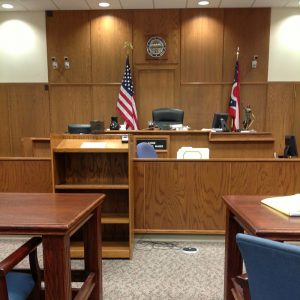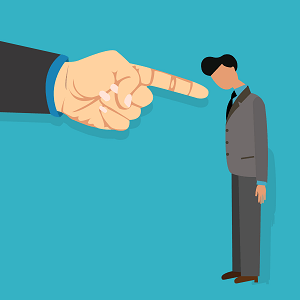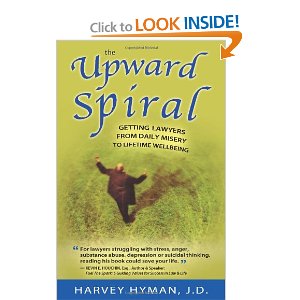Once upon a time, I was a trial attorney at a personal injury defense firm. I was good at it. I always pushed hard; always did the best job possible. I won a good share of cases, and, of course, lost a few as well. I was valued highly enough to be made a partner shortly after joining the firm.
But I had a dirty little secret. I had bipolar disorder, which was well-controlled through a close partnership with a good psychiatrist. Still, in my mind, if word ever got out, my employers would see me as weak, a liability. To a degree, I understood. If the insurance companies that paid the bills learned that one of the firm’s trial attorneys had such a condition, their mandate would be clear: if you want our business, get rid of him. That is what I assumed.
Throughout my career, colleagues would make offhanded remarks about someone “not taking his medication.” I would grit my teeth and ignore it.
Instead, I was able to construct an alter-ego, the “happy warrior.” I had a smile on my face and a sardonic remark ready on cue. But I went about my daily business feeling like a secret agent in a Cold War spy movie. If my cover was ever blown, I was certain that my career would be at an end.
Over time, maintaining this secret identity while dealing with the usual strains of trial practice gave rise to a growing depression. Yet I still performed at a high level and still got results.
Although I had a close friend at the firm, another partner, he would deflect when I tried to talk to him about my depression, so I stopped. I began to worry that others at the firm might know about me.
Fear and the sense of isolation only fed upon themselves in a continuous cycle. I finally experienced a severe episode of depression that led to a period of disability. When I told my boss what was going on, he expressed genuine surprise that I was suffering from depression at all.
When I returned to work, I felt better, but I remained wary. Instead of engaging in a conversation about what had happened, we all acted as though nothing had occurred. The computer was rebooted, and business continued on as usual. I went back undercover, and no one seemed to mind.
Simply due to scheduling conflicts and adjournments, it was some time before I tried another case. I admit that I was a little nervous, but I was having no trouble handling my case load. I was puzzled when my boss came into my office one afternoon as I was preparing for the trial. He asked me if I felt good to go. He had never done that before. I said, “yes,” because I felt perfectly up to the task. I never asked myself, “If he is worried about my performance, why is he even letting me try the case?”
At trial, the insurance company sent an adjuster to audit the proceedings, a routine procedure. I knew him well, and he had an excellent grasp of the case, even though he had not been involved before trial. We had constant discussions about what was going on, and we seemed to be in sync. Suddenly, the insurance company pulled my old friend off the case and replaced him with a mid-level manager who consistently praised my performance.
The case went to verdict, and the jury awarded somewhat less than what the insurance company had offered settle for. To preclude the possibility of an appeal, the insurance company threw in a few more dollars. Case closed, on to the next one. To me, that was a pretty good result.
Was I in for a big surprise.
Shortly after the trial, year-end reviews were scheduled. I was getting ready for another trial, and I was very excited about it, so I wasn’t really paying attention to what was going on in the office. Other attorneys were getting their reviews – important because raises would be discussed – but I was never called in.
Ultimately, my case settled after much hard work on all sides, and the usual time for reviews was long past. I did start to worry then. I even made a remark to my secretary about it.
The call finally came. When I stepped into the conference room and saw every equity partner in the firm waiting for me, I knew. The spy had been caught, but what would happen?
My boss said that they waited to speak with me because they did not want to put pressure on me while I was preparing for another trial. He asked me if I felt capable of trying cases. I paused, and then broke under the years of strain. I wept, and answered, “No.” Whether that “No” was true then or true now or was ever true, it was the most humiliating moment of a 20-year career.
My boss started to dissect my prior trial, telling me that the insurance company’s representative was reporting that I was doing a bad job. He even told me that the supervisor at the insurance company knew that I had depression. After the expected awkward silence, another partner suggested that “we find a creative solution” to keep me at the firm. I made some suggestions over the next few months. No replies were forthcoming. I was quietly being swept out the door. It wasn’t hard to get the message. I found another job, and moved on.
The whole experience seemed to confirm everything I feared about being a lawyer with depression. Currently, I am not practicing, and am seeking other opportunities.
But if the story ends there, what is the point? Can I offer my account as a teaching opportunity? At the very heart of the tale lies the sad truth that we, as lawyers, trained to be superlative communicators, can utterly fail to make each other understood when it comes to depression. Should I have been more candid about my condition? My employers never told me what concerns they had or what they knew. Could all of us have been proactive for our mutual benefit, especially after I returned to work? I believe that there had been an opportunity to open a constructive dialogue, but my fear told me to keep my mouth shut. I cannot speak for my former employers, although I highly doubt that they held any malice. I doubt that they thought much about it at all, until some critical pressure was brought to bear, whether from within or outside of the firm. Unfortunately, by the time everyone was talking, my job at a firm I loved was gone.
I miss working there. I still have close friends there. I see them when I can, which is not often enough. Just recently, I ran into my secretary, and we briefly chatted about my plans for the future. And then she said something that cut me to the quick: “You were a good lawyer.”
— Anonymous Guest Blog













